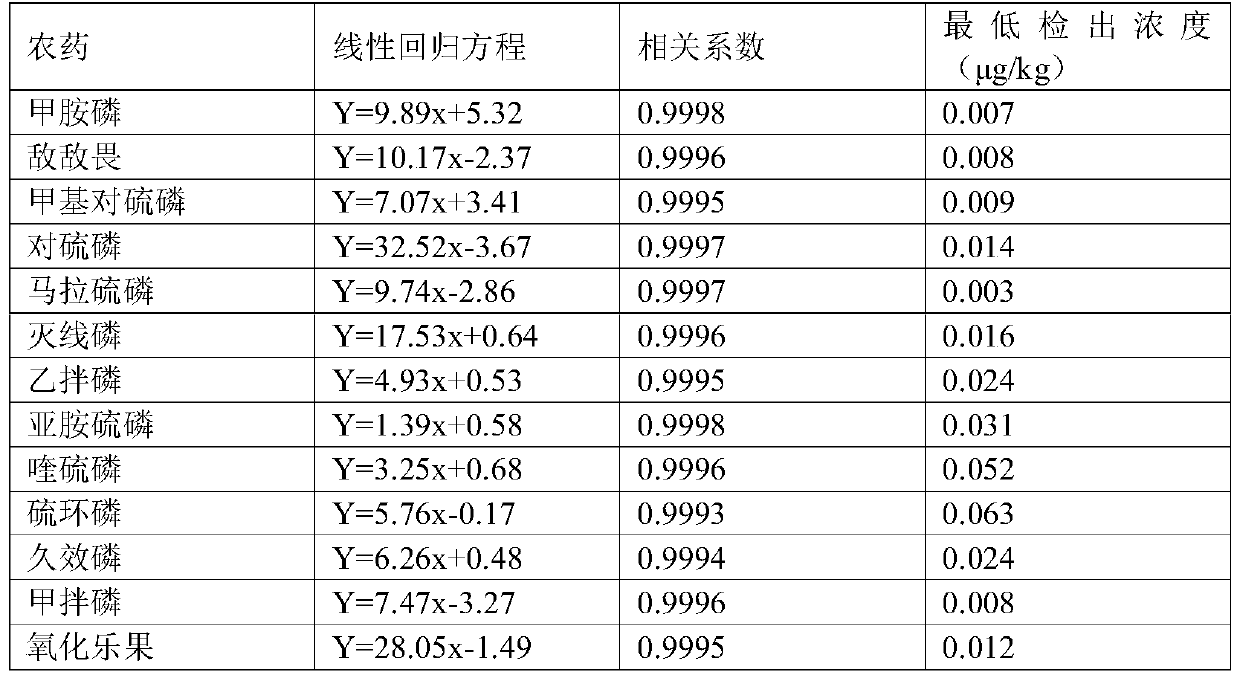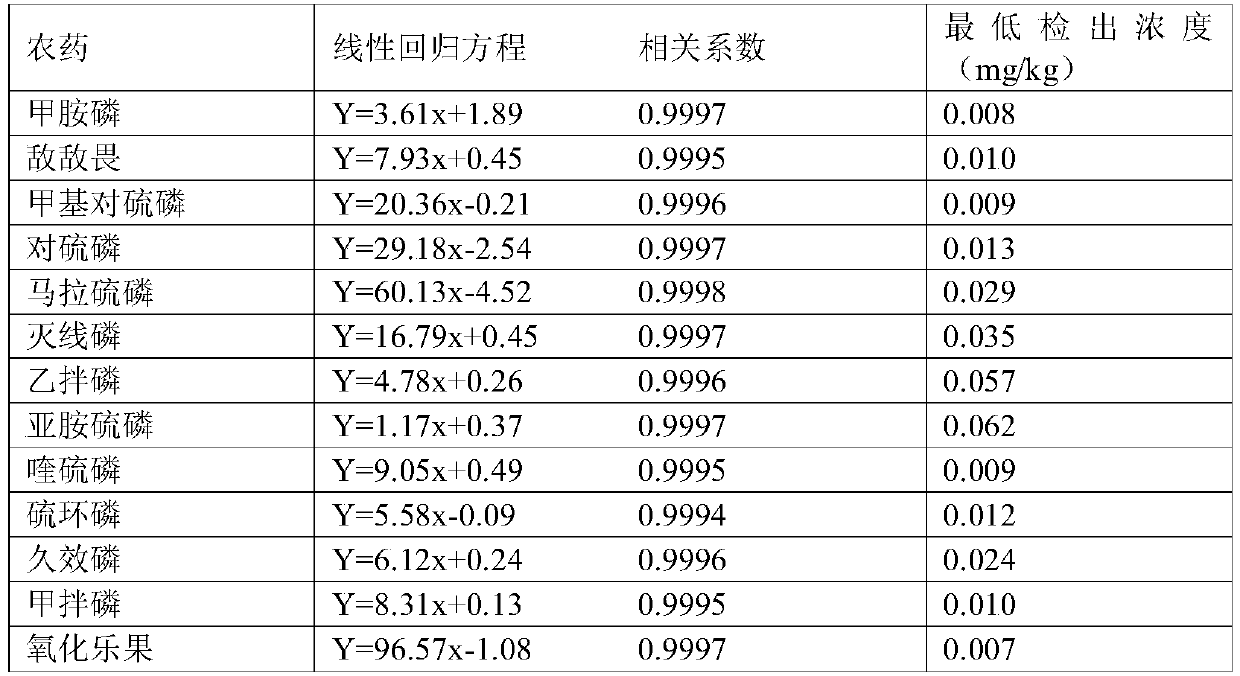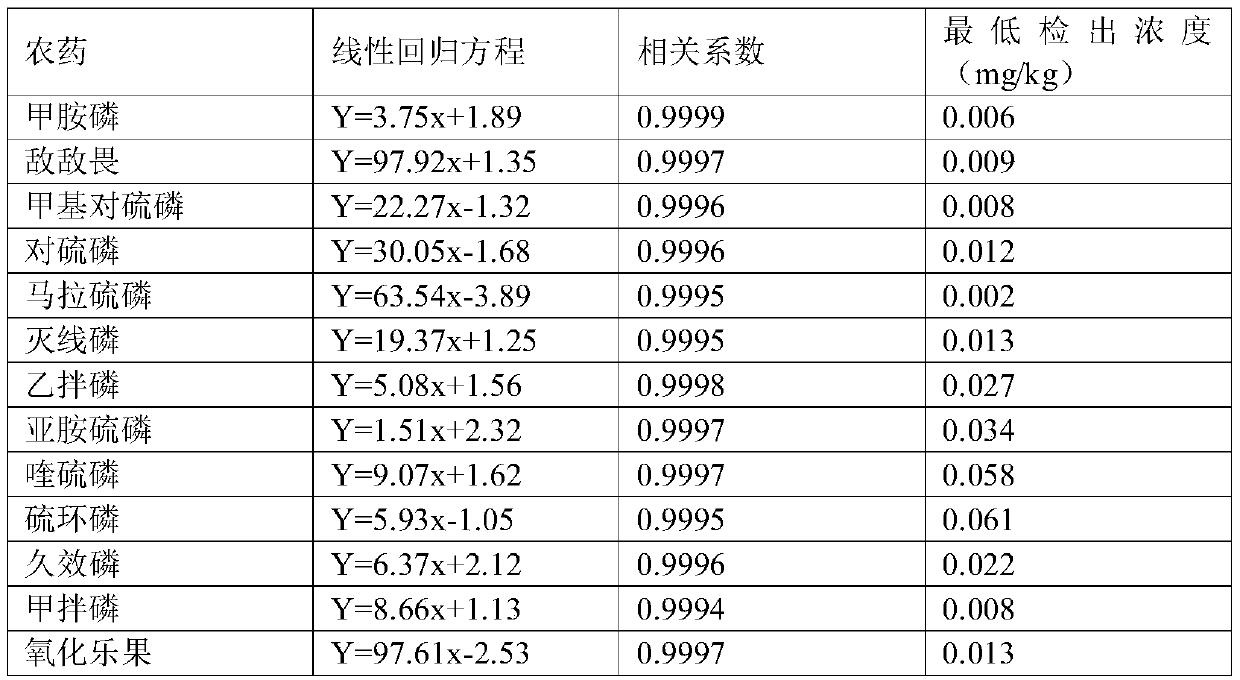A method for detecting organophosphorus pesticide multiple residues in vegetables and fruits
An organophosphorus pesticide, multi-residue technology, applied in measuring devices, instruments, scientific instruments, etc., can solve the problems of affecting consumers' food safety, life-threatening organisms, excessive pesticide residues, etc., to achieve less impurity peaks, adsorption and desorption paths short, the effect of improving the recovery rate
- Summary
- Abstract
- Description
- Claims
- Application Information
AI Technical Summary
Problems solved by technology
Method used
Image
Examples
Embodiment 1
[0029] 1. Determination of multiple residues of organophosphorus pesticides in vegetables and fruits, including the following steps:
[0030] S1: Preparation of solution:
[0031] (a1), control solution: Accurately draw 5 mL of methamidophos, dichlorvos, methyl parathion, parathion, malathion, methamidophos, dichlorfos, imidophos, Quetiafos, thionate, monocrotophos, phorate, omethoate standard solution, and diluted with acetone, prepared to a concentration of 0.01μg / mL, 0.05μg / mL, 0.1μg / mL, 0.5μg / mL, 1μg / mL, 2μg / mL, 4μg / mL control solution.
[0032] (b1), sample solution: burn anhydrous sodium sulfate at 540°C for 2.5h, cool and store in a desiccator for later use; then soak the activated carbon in 2.5mol / L HCl solution, suction filter, and wash with water until there is no chloride ion , and then dried at 120°C for later use;
[0033] Weigh 22g of the sample and pulverize it, add 50g of anhydrous sodium sulfate and grind it into a dry powder, then add 0.6g of activated car...
Embodiment 2
[0059] 1. Determination of multiple residues of organophosphorus pesticides in vegetables and fruits, including the following steps:
[0060] S1: Preparation of solution: same as Example 1.
[0061] S2: SPE column solid phase extraction:
[0062] (a2), packing and activation: choose C 18 SPE column, weigh 0.2g ACF column, then use 5mL n-hexane: ethyl acetate: acetone 1:5:4 mixture, 5mL methanol solution, 3mL methanol water solution with a mass fraction of 10% to pass through the SPE column to activate ;
[0063] (b2), rinse: load the sample solution after constant volume in b1, rinse with 2mL distilled water and 5mL methanol solution with a mass fraction of 20% in sequence, and discard the rinse solution;
[0064] (c2), elution: sequentially use 5mL of petroleum ether, 5mL of chloroform, 5mL of isopropanol: ethyl acetate: chloroform in a mixture of 1:2:7.5, 1:4.3:8.5, 1:5.2:9.3 Elution, the elution flow rate is 0.3mL / min, collect the eluate, concentrate to nearly dryness, ...
Embodiment 3
[0082] 1. Determination of multiple residues of organophosphorus pesticides in vegetables and fruits, including the following steps:
[0083] S1: Preparation of solution: same as Example 1.
[0084] S2: SPE column solid phase extraction:
[0085] (a2), packing and activation: choose C 18 SPE column, weigh 0.2g ACF column, then use 6mL n-hexane: ethyl acetate: acetone 1:6:5 mixture, 6mL methanol solution, 6mL methanol water solution with a mass fraction of 10% to activate the SPE column ;
[0086] (b2), rinsing: load the sample solution after constant volume in b1, rinse with 3mL distilled water and 6mL methanol solution with a mass fraction of 20% in sequence, and discard the eluate;
[0087] (c2), Elution: use 6mL of petroleum ether, 6mL of chloroform, 6mL of isopropanol: ethyl acetate: chloroform in a mixture of 1:3.5:8, 1:4.6:9, 1:5.5:9.5 Elution, the elution flow rate is 0.3mL / min, collect the eluate, concentrate to nearly dryness, and dilute to 5mL with acetone;
[0...
PUM
| Property | Measurement | Unit |
|---|---|---|
| detection limit | aaaaa | aaaaa |
| correlation coefficient | aaaaa | aaaaa |
Abstract
Description
Claims
Application Information
 Login to View More
Login to View More - R&D
- Intellectual Property
- Life Sciences
- Materials
- Tech Scout
- Unparalleled Data Quality
- Higher Quality Content
- 60% Fewer Hallucinations
Browse by: Latest US Patents, China's latest patents, Technical Efficacy Thesaurus, Application Domain, Technology Topic, Popular Technical Reports.
© 2025 PatSnap. All rights reserved.Legal|Privacy policy|Modern Slavery Act Transparency Statement|Sitemap|About US| Contact US: help@patsnap.com



